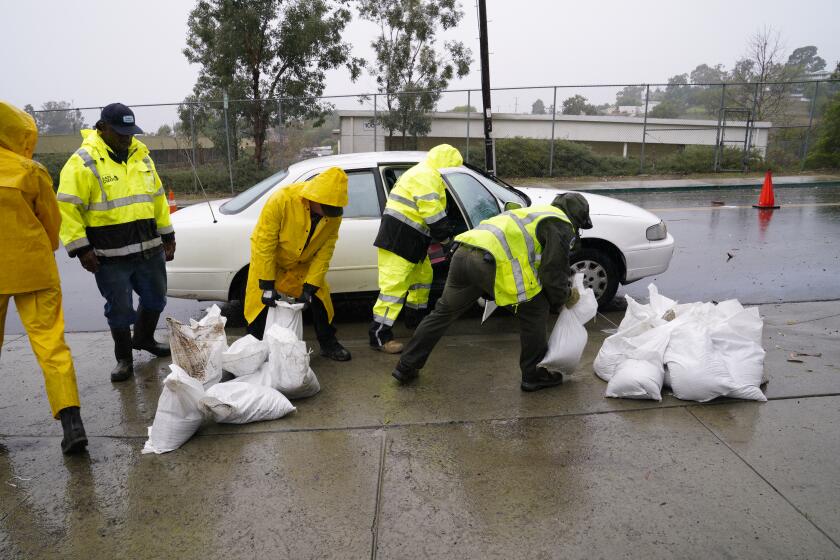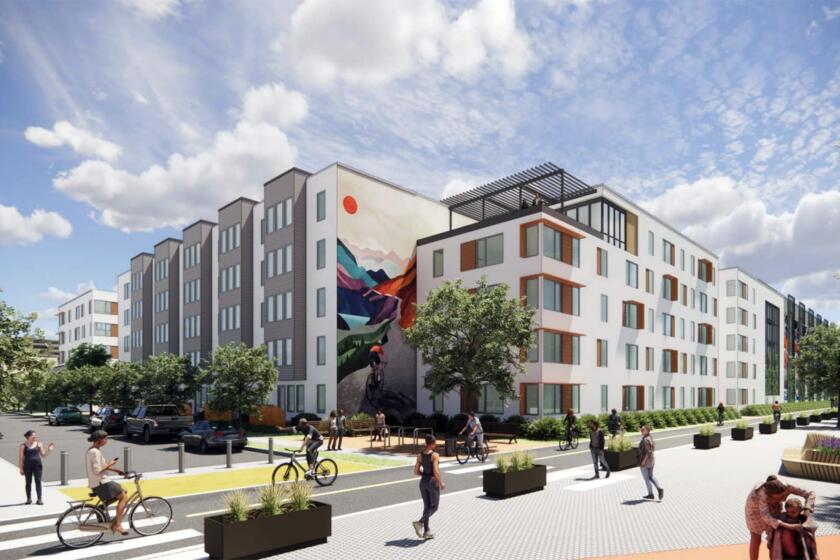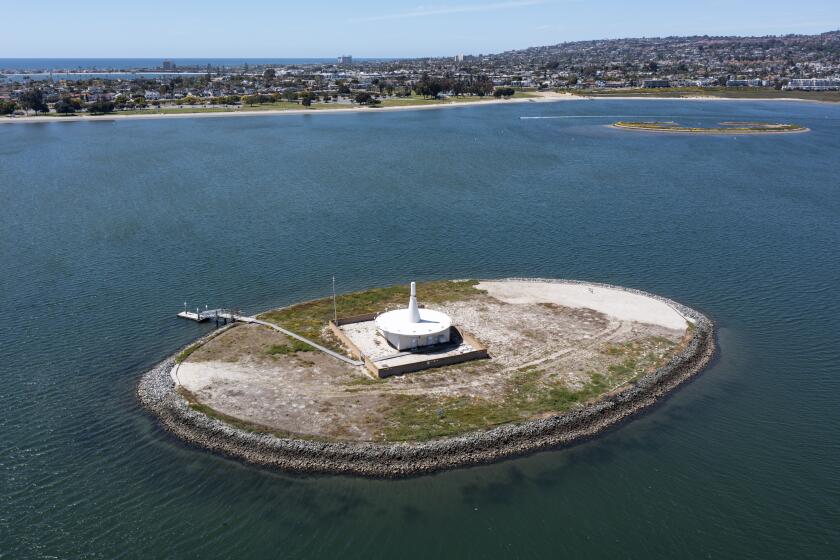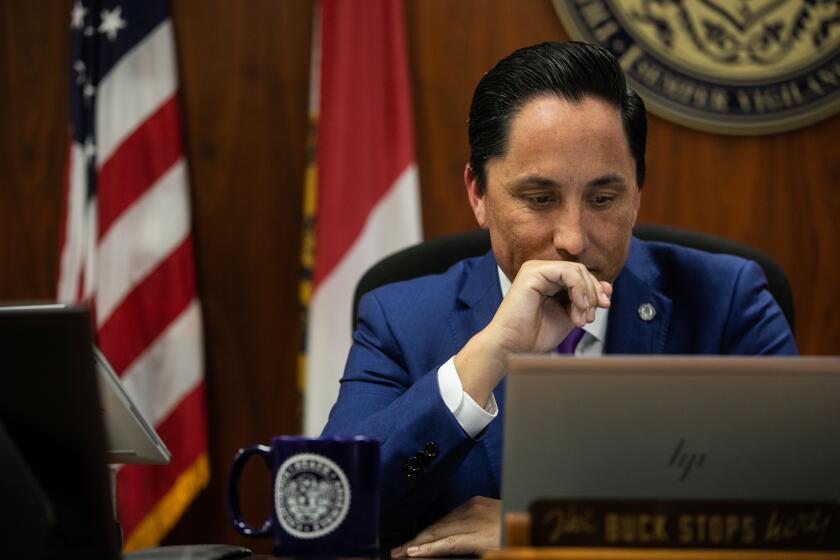Supporters dispute Citizens’ Plan approval threshold
Prospects for a combined downtown convention center annex and Chargers stadium could depend on voter approval this November of the Citizens’ Plan, but there’s a fierce dispute over what would constitute voter approval.
Proponents of the plan, which would raise hotel taxes to possibly fund the annex and allow it to be potentially combined with a privately financed football stadium, insist the measure needs support from only a simple majority of voters.
CHARGERS STADIUM: COMPLETE COVERAGE
City Attorney Jan Goldsmith’s office, however, has issued multiple opinions strongly asserting that the proposal, which will appear as Measure D on the ballot, requires approval from two-thirds of voters.
No one disputes that two-thirds approval is required for Measure C, a separate hotel tax hike on the November ballot that the Chargers are proposing to finance essentially the same project.
With both proposals receiving tepid support in polls, whether the Citizens’ Plan needs approval from a simple majority or two-thirds of voters could be crucial to whether the downtown project gets built – and whether the Chargers stay in San Diego.
RELATED: Chargers dispute risks of stadium measure
Tax increases are subject to two-thirds approval when they seek to raise revenue for a specific purpose, but are subject to only simple majority approval when they seek to raise revenue for general purposes.
For example, a sales tax increase specifically devoted to building transportation projects would require two-thirds approval. While a sales tax hike would only require simple majority approval if the revenue could be used for anything.
And that’s the heart of the dispute, which both sides concede will almost certainly end up in court if Measure D receives support from somewhere between a simple majority and two-thirds of voters.
Because Measure D would place into the city’s unrestricted general fund the additional revenue from raising hotel taxes from 12.5 percent to 15.5 percent, proponents contend it is a tax for “general” purposes.
Hoteliers would have the option of using some of the additional revenue to pay for the convention center annex and to market San Diego as a destination, but they would need approval from the City Council and they might choose not to use the money at all.
“Whether hotels will avail themselves of the tax credits to promote tourism and expand the convention center is completely voluntary and not yet known,” according to Jim Sutton, a longtime election lawyer who helped write Measure D.
“And there is no guarantee of any funding, or any particular amount of funding, for these specific purposes,” Sutton has said. “Any hotel tax revenues deposited into the general fund will be used for general governmental purposes as determined by the council, and not for any specific purpose.”
One of Goldsmith’s top lieutenants, Chief Deputy City Attorney Carrie Townsley, has described the situation quite differently in multiple opinions this year.
RELATED: Goldsmith pans Citizens’ Plan
“Despite the initiative’s stated requirement for depositing the new revenue in the general fund, it permits diversion of the funds before they reach the city, making them unavailable for more general use,” Townsley wrote earlier this month.
“By doing so, the initiative intercepts the new tax revenue and diverts it to funding a downtown convention center and tourism marketing,” she wrote. “It allows the hotel operators to take the revenue directly, bypassing the city treasury and any city budgeting or decision-making processes.”
Townsley also said the City Council approval called for by the initiative would be required —not discretionary.
She said when determining the purpose of a proposed tax increase, it’s crucial to look at the plan in its entirety.
“A court would look at the initiative as a whole and the intended purpose of the new revenue stream,” she said, contending that purpose is to have a convention center annex built. “The clear intent of the initiative is to create a revenue stream to further the initiative’s purposes. This underscores the character of the increase as a special, not a general, tax.”
Cory Briggs, a local attorney and the chief author of Measure D, said this week he’s highly confident a court would rule that only simple majority approval is required.
He compared the hotel-tax revenue the operators could use to build the convention center annex to the tax credits people get when they install solar power systems in their home.
“It’s a special tax if it says ‘thou shall spend the money on X,’ it’s not a special tax if the voters say someone who installs solar on their house may claim a tax credit,” Briggs said. “That’s not a special tax, even though, obviously, that tax credit is going to be paid for out of tax revenue.”
Townsley said on Thursday that argument is flawed, partly because the higher hotel taxes, sometimes called transient-occupancy taxes, would be paid by hotel guests, not by hotel operators.
“The solar example does not pertain here,” she said. “You can’t get a tax credit for someone else’s tax payment. The hotelier does not pay TOT taxes and so cannot get a tax credit for TOT taxes — no more than you could get a tax credit for property taxes paid by your neighbor.”
The approval threshold for both Measure C and Measure D could be reduced to a simple majority if the state Supreme Court issues a decision before November on a March appellate ruling that said tax increases proposed as part of citizen’s initiatives are subject to simple majority approval instead of two-thirds approval.
But Goldsmith and proponents of both measures have said they don’t expect the Supreme Court to issues its decision quickly enough to affect the November election.
PREVIOUS

A study by Hunden Strategic Partners, a real estate consulting and advisory firm, commissioned by Conventional Wisdom, an assembly facility programming and management firm, talk about the positive impact Measure C will have on the downtown area.






